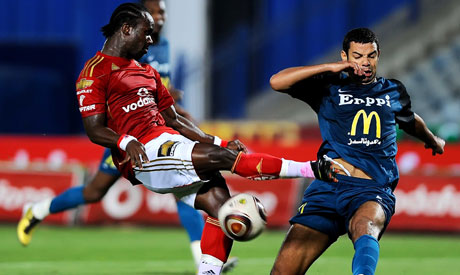
Enppi's international defender Abdel-Zaher El-Sakka blocks a shot from Ahly's Liberian striker Francis De Forkey
The Egyptian football hierarchy changed a decade ago with the rise of new powerhorses like Enppi and Petrojet. Belonging to the petroleum sector, Enppi made the top league in 2002 followed by Petrojet a year later.
Both teams sidestepped the financial woes that blighted the majority of Egyptian clubs after winning the huge backing of Petroleum Minister Sameh Fahmy, which allowed them to get some of Egypt’s best players, like international striker Amr Zaki (Enppi signed him from Mansoura in 2003 for a then record fee of LE1.5 million), international winger Ahmed Elmohamady (an Enppi player who has just been sold to Sunderland), international playmaker Walid Soliman (moved to Ennpi this season from Petrojet), Ghanaian international strikers Eric Bekoe and Coffi Bekoe (both Petrojet) and many others.
But with Fahmy having been forced to leave office following the 18-day Egyptian Revolution, the question is now whether Enppi and Petrojet, additional to Asyut Petroleum and GASCO — who are still competing in the second division — can withstand losing some of the financial support they have enjoyed in recent years.
“All matters are stable. The departure of Sameh Fahmy will not affect us at all, because the clubs belong to companies not the minister, or the ministry,” Enppi assistant coach Mahmoud Saleh told Ahram Online. “We have our own budget. Our club contributes to advertising for our company, which earns millions of pounds."
Reports about the purchasing power of these clubs and hefty salaries paid for players are exaggerated, according to Saleh. “The reported amounts in terms of salaries or budget are not true. Walid Soliman is the highest paid player in our squad with a LE900,000 annual salary,” he added.
“Any other player with the same talent at (Cairo's) Ahly or Zamalek receives at least three or four million Egyptian pounds per season.”
Public money abuse
Fahmy was widely criticised by local media for spending big to strengthen the squads of Petrojet and Enppi last summer. Reports said the Petroleum Ministry spent around LE82 million to bring in new players for the mid-table teams. The ministry should not have used public money to benefit football clubs, analysts said.
Lawyer Hesham Abd-Rabou filed a lawsuit against Fahmy for "spending millions from public money to help Petrojet and Enppi compete for the league title". He also demanded that the ministry dissolves the football clubs.
Former Ahly star Yasser Rayan, who coaches another petroleum club, second-division side GASCO, leapt to the defence of the clubs. “To be honest, Fahmy played an instrumental role in supporting the petroleum clubs. But we must acknowledge that these clubs are institutions that do not rely on certain persons,” he told Ahram Online.
“The Petroleum Ministry benefited a lot from the clubs as well, in terms of advertising revenues. We can only cut any extra expenses to ensure the continuity of these clubs. We can also relate every club to a specific city in Egypt, to allow fans to support them. This will further enhance the league,” Rayan said.
But while the future of the clubs is in jeopardy, it is true that they made a contribution to Egyptian football. With new era in Egypt beginning, a new hierarchy could prevail also in football.
Short link: